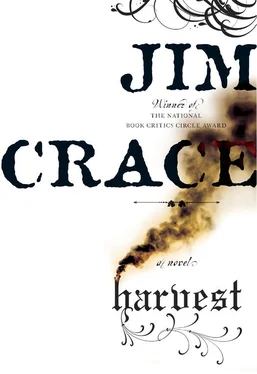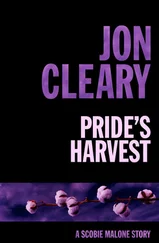It seems an age since I was here with Mr. Quill and Master Kent. We’d named our Gleaning Queen and the master had said what he always says about “this noble day,” how in order of their station everyone and everything would benefit from gleaning — the families who worked so hard, the thoughtless cattle and the thankless geese, and finally the hogs. He had not said that hogs precede the oxen and the plow. He had not reminded us that this once-was barley field was set aside for winter-planted wheat. He had not promised that bread would follow beer. I remember thinking, bitterly, So our master’s dreams for us do not include another crop. Our final harvest must have come and gone. I remember Master Jordan’s words: “You’ll never need the plow again.” We’ll see.
Mistress Beldam’s husband has taken charge. I’m left to lead the animals and urge them on, flicking their pink ears. He grasps the plow handles and plants his feet into the soil, leaning back in expectation of the pull. He has to find a leverage that takes account of cattle, beam and soil, and finding it ennobles him: I’ve not seen his face so passionate up till now, or so full of consequence. He knows what plowing is. If anyone is watching — and I hope Mistress Beldam is — it will look as if he’s pulling against the oxen rather than working with them, that he’s the strongest of the three. Just for today, he’s walking on a field in heaven rather than on earth, he’s plowing up the lands of time, marking out the ridges and the furrows of a trying life. I can tell he has debts to settle of his own. Did not Mr. Quill say that these newcomers were fugitives from sheep themselves, exiles from their own commons? That would explain the man’s evident keenness to commence. We’ve broken bread together. Now he wants to break the earth with me. We’ll liberate the spirits of the soil. We’ll let the little devils breathe.
The key to plowing is to hold a steady line, to be symmetrical, a skill I never quite mastered. I point down the field at a tapered oak which stands high above the hedgerow in the dell. That is the headland we will be aiming for with our first cut, I say. I fancy that even the oxen lift their heads and take a line on it. They place it in the middle of their horns. The oak is known for being still. It will not duck its head or lean, no matter what the winds might try. An oak is trustworthy. It wants the plow to find a true, straight way, then it can preside all year over a pattern that is pleasing to its eye.
The field seems limitless from where we stand, and beyond our mastery. It would normally take twelve days to plow its stubble under, even if we had our usual team of four oxen, and twenty brawny men to help and take their turns. But we are only two, and we do not mean to make a meal of it. We mean to make only a day of it. A narrow scar is all we have in mind: a field length down, the headland turn, a field length back. We will, though, do our best to make a noble and an honest scar. It will be straight and proud if good fortune labors at our sides. The single central ridge will be a proper height, the pair of furrows deep. “This will be … to all of our advantages,” I tell my helpmate, hoping to provoke a conversation. But he stays silent. He loops the reins over his head, with a practiced hand and a fitting nonchalance, and holds them taut round his right shoulder and under his left arm. I flick the oxen. We begin. Three steps, and already we are opening a top and putting up a high-backed slice of soil.
It is not long before he’s whistling. His ridge and furrow channel the tune as we delve across the field. A plowman’s whistle has the strength to soften clods and break up stones. A plowman’s whistle warns the soil a blade is on its way. I am so satisfied I cannot stop myself from chattering. I’m telling him about the many, endless troubles of the week. I talk of Cecily, and Charles Kent, my boyhood friend. I tell him what a brave and decent man Mr. Quill has proved himself to be. Oxen are noble creatures, I say. They work. But sheep “from what I’ve heard”—what’s his experience? — are helpless beasts: “We’ll have to wait on them like slaves on lords, come spring. Like fools.” I can’t be sure if he is listening. He will not cease his whistling. But we both have busy lips this afternoon, and we are intimate through toil. Anything that’s shared across the backs of oxen is intimate. We make our way toward the dell, and make our way back to the top-end gate. Now our wheels are clogged with mud. I have to free them every twenty paces with a heavy kick and, when that fails, with my bare hands. The rooks and starlings pick the furrows in the damp wake of the plow.
I make my plowman stand away this afternoon when we have cleaned the blades and put the plow back in its place, and let the oxen roam off where they will. This is a task I want to finish without his help. I barrow in a bag of wheat seed for winter planting and use a casting shovel and some sacking in the corner of the field to select the heaviest grain for my baskets. I know I ought to let the strip of turned soil lay and mellow for a week or so, or at least let it be broken down by the rain, which has already begun to lay its own seed on the ground. But there’s no time. Good practice must be sacrificed. I leave Beldam’s husband resting in the corner of the remaining scrub, and sweep my seeded hands across the land, the richest of all scatterings. The farmer in me — yes, I can boast of that — knows that the best cruel nurture for this early crop is that after a week or two of growth its green ribbons are crushed by rolling. That way, the ground is firmed. The plants can take a steady grip. Wheat — like men and women — benefits from being crushed. Crushing makes it fit to stand up all the better. But there is only this afternoon for making good, for marking my revenge, my countryman’s revenge, on Edmund Jordan and his sheep. This narrow sweep of wheat will be my farewell gift. So I walk the furrow for the final time, in the strengthening drizzle, taking it as a blessing that the seed corn is being watered the instant that it leaves my palm.
It is on my way up from the dell, with perhaps little more than a hundred paces and fifty sweepings of my hand remaining, that the light begins to fail. I turn to look, beyond the hedgerows and the pyramidal oak, at the dark horizon rearing deep and solid with gray-on-purple clouds. The few remaining scraps of blue blink barely brighter than an eye. What sunlight there is hardly makes a mark upon our field, though on the wood end of our land its best surviving ray is broad and strong enough to radiate and rim the beeches’ pale bare branches, the grasping talons of the ash, and the high-veined frettings of the elms. Then it falls and slowly beams from common ground to field, as if searching for something. It is reluctant to depart. It even catches smoke pots and roofs before it lifts again to paste its silver on the clouds. For a moment, they are faced with light. Our field is black. It’s shiny, suddenly. And then the day is gone. Its candle has been snuffed, or drenched. That is the end of it.
Dusk has deepened now. If it wasn’t for the rain, I could be walking through the steep-domed, unlit chamber of a great cathedral, roofed by coal-black vaults of cloud. This downpour has not got the force to last. But for the moment it takes hold. The clouds carried too much weight before they reached this place. I can almost hear them sigh with relief as they let go their load. The furrows in our barley field are already brimming and draining off like streams in flood. The clouds intend every single seed I’ve spread to have its year’s supply of drink in one delivery. The earth turns sticky. It clings heavily to my feet, and lards my legs with every step I take. It’s hard work even walking in it now. I look up to the corner of the field, and wave at where I last saw Mistress Beldam’s husband. I call out even, although my words are washed away. But anyway I think the man has gone already. He will have had his fill of late of being out in all weathers. He will have gone into the cottages or taken shelter in the barn. For an instant I imagine him in Mistress Beldam’s arms among the field and pasture tools, among the nettles in the dark. She is getting wet and cold as she clings on to him.
Читать дальше












